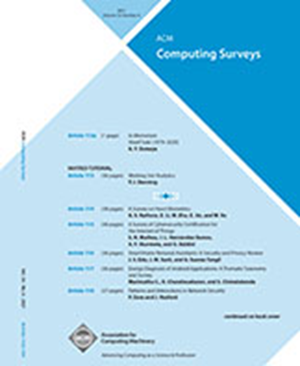机器学习驱动的材料缺陷检测综合调查
IF 28
1区 计算机科学
Q1 COMPUTER SCIENCE, THEORY & METHODS
引用次数: 0
摘要
材料缺陷(MD)是影响产品性能和引起相关产品安全问题的主要挑战。快速准确地识别和定位缺陷是解决与缺陷检测相关的当代挑战的关键研究工作。近年来,在机器学习(ML)技术迅速发展的推动下,特别是以深度学习为例,机器学习已迅速成为材料缺陷检测(MDD)的核心技术和重要研究方向。通过对最新文献的全面回顾,我们系统地将机器学习技术应用于MDD中,分为五类:无监督学习、监督学习、半监督学习、强化学习和生成学习。我们详细分析了所使用的主要原理和技术,以及与这些技术相关的优势和潜在挑战。此外,调查重点关注复合材料的缺陷检测技术,复合材料是重要的材料类型,在航空航天,汽车,建筑和可再生能源等各个行业中应用日益广泛。最后,该调查探讨了利用ML技术的MDD的潜在未来方向。这项调查巩固了基于ml的MDD文献,并为未来的研究和实践提供了基础。本文章由计算机程序翻译,如有差异,请以英文原文为准。
A Comprehensive Survey on Machine Learning Driven Material Defect Detection
Material defects (MD) represent a primary challenge affecting product performance and giving rise to safety issues in related products. The rapid and accurate identification and localization of MD constitute crucial research endeavors in addressing contemporary challenges associated with MD. In recent years, propelled by the swift advancement of machine learning (ML) technologies, particularly exemplified by deep learning, ML has swiftly emerged as the core technology and a prominent research direction for material defect detection (MDD). Through a comprehensive review of the latest literature, we systematically survey the ML techniques applied in MDD into five categories: unsupervised learning, supervised learning, semi-supervised learning, reinforcement learning, and generative learning. We provide a detailed analysis of the main principles and techniques used, together with the advantages and potential challenges associated with these techniques. Furthermore, the survey focuses on the techniques for defect detection in composite materials, which are important types of materials enjoying increasingly wide application in various industries such as aerospace, automotive, construction, and renewable energy. Finally, the survey explores potential future directions in MDD utilizing ML technologies. This survey consolidates ML-based MDD literature and provides a foundation for future research and practice.
求助全文
通过发布文献求助,成功后即可免费获取论文全文。
去求助
来源期刊

ACM Computing Surveys
工程技术-计算机:理论方法
CiteScore
33.20
自引率
0.60%
发文量
372
审稿时长
12 months
期刊介绍:
ACM Computing Surveys is an academic journal that focuses on publishing surveys and tutorials on various areas of computing research and practice. The journal aims to provide comprehensive and easily understandable articles that guide readers through the literature and help them understand topics outside their specialties. In terms of impact, CSUR has a high reputation with a 2022 Impact Factor of 16.6. It is ranked 3rd out of 111 journals in the field of Computer Science Theory & Methods.
ACM Computing Surveys is indexed and abstracted in various services, including AI2 Semantic Scholar, Baidu, Clarivate/ISI: JCR, CNKI, DeepDyve, DTU, EBSCO: EDS/HOST, and IET Inspec, among others.
 求助内容:
求助内容: 应助结果提醒方式:
应助结果提醒方式:


